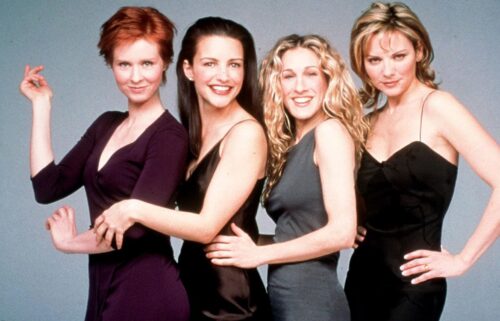A little-known version of Mickey Mouse came before ‘Steamboat Willie’ — and he wasn’t very nice
By Scottie Andrew, CNN
(CNN) — Before he became the biggest mouse in the biz, Mickey Mouse welcomed audiences to the movies.
Beginning in 1928, the mischievous Walt Disney icon starred in short films that played before the main attractions at theaters across the US. He charmed moviegoers with his black-and-white antics and high-pitched squeak, all backed by innovative new sound technology.
The best-known Mickey Mouse film from those days is “Steamboat Willie,” the seven-minute short that hit theaters in November of that year and kickstarted his international fame. But it wasn’t Mickey’s silver-screen debut. He first appeared in “Plane Crazy,” a silent short film that test-screened months before “Steamboat Willie” and portrays Mickey in a less-than-flattering light.
Copyrighted in 1928, the silent version of “Plane Crazy” joins “Steamboat Willie” in entering the public domain this year, which means they’re free for people to share, copy or use without permission.
Unlike “Steamboat Willie,” fans won’t find “Plane Crazy” on Disney+ or earning more than a passing mention in the annals of Disney history. Here’s what to know about the first-ever Mickey Mouse short, and why you’re probably not familiar with it.
‘Plane Crazy’ wasn’t an immediate success
In “Plane Crazy,” Mickey sets out to pilot a two-seater plane in an attempt to emulate Charles Lindbergh, who completed his historic flight from New York City to Paris in 1927. Minnie takes the passenger seat, and after some frenetic mishaps and the inadvertent milking of Clarabelle Cow, the couple successfully gets off the ground.
This is when things start getting a little weird. After Minnie rebuffs his advances, Mickey steers the plane in daredevil loops to scare her. When she trembles in fear, he laughs at her and then pulls her into an unwanted smooch.
Fed up with her beau’s antics, Minnie eventually hops out of the plane and parachutes to safety using her bloomers. Mickey’s landing is far less graceful, and he’s rejected by Minnie after laughing at her billowing undergarments.
“Plane Crazy” and another early short, “The Gallopin’ Gaucho,” weren’t instant successes as silent films. It wasn’t until Disney and his collaborator Ub Iwerks synced their animation with sound in “Steamboat Willie” that audiences learned to love the cartoon mouse.
To capitalize on “Steamboat Willie’s” success,” sound versions of “Plane Crazy” and “The Gallopin’ Gaucho” were released in theaters in 1929. (“Plane Crazy” with sound won’t join the public domain until 2025.
Early Mickey Mouse was meaner than he is now
The first Mickey cartoons portrayed him as spikier and more tantrum-prone than the good-natured Disney mascot fans know today. He behaved like something of a cad toward his beloved Minnie, turning her stomach with loop-de-loops and stealing kisses. This Mickey fumed, fought and regularly failed — all part of his early appeal.
“Mickey wasn’t perfect, but he would always find a resourceful way to get out of situations,” lead animator Eric Goldberg says in the Disney+ documentary “Mickey: The Story of a Mouse.”
Once Mickey became beloved by moviegoing children it was time to, in the words of animation historian David Gerstein, “clean up his act.”
“He can’t behave in any way that would be considered ‘bad behavior,’” Gerstein says in the Disney+ documentary. In the mid-1930s Mickey became a sanitized straight man and has remained one ever since.
Contemporary viewers have expressed alarm at the older, cruder Mickey. A Letterboxd user named Rian noted that the “Plane Crazy” version of the Mouse was “a bit of a gutter rat,” manipulating Minnie and cruelly plucking the tail from a turkey to use on his plane.
Mickey replaced an earlier character
Mickey Mouse was Walt Disney’s second anthropomorphic cartoon creature, but the first over which the innovator had true ownership.
The mouse was allegedly dreamed up by Walt Disney in 1928 after Universal Pictures reclaimed ownership of Oswald the Lucky Rabbit, a Charlie Chaplin-esque animated character Disney and Iwerks created in the late 1920s. Disney wanted to keep creating animated shorts, but without Oswald, he needed a new big-eared star.
What it means for Mickey to enter the public domain
Now that two of the first Mickey Mouse shorts are in the public domain, people and entities other than the original copyright owner can manipulate or crib from the shorts. Basically, the copyrights have expired, and the works now belong to the public.
For an example of what that might look like, we can turn to author A.A. Milne’s original Winnie-the-Pooh stories, which joined the public domain in 2022. While Disney’s animated versions of Pooh and his Hundred-Acre Woods neighbors remain protected by copyright, the copyright to Milne’s Pooh stories have expired. So, in 2023, British director Rhys Frake-Waterfield made an independent horror film about a murderous Pooh and Piglet who seek revenge on Christopher Robin.
What creatives cannot do, though, is use the current versions of Mickey and Minnie in a project without the involvement and permission of the Walt Disney Company. Only the earliest black-and-white versions of Disney’s favorite mice have entered the public domain.
“More modern versions of Mickey will remain unaffected by the expiration of the Steamboat Willie copyright, and Mickey will continue to play a leading role as a global ambassador for the Walt Disney Company in our storytelling, theme park attractions, and merchandise,” a Disney spokesperson told CNN Business.
CNN has reached out to Disney for comment on its plans for “Plane Crazy” and “Steamboat Willie” going forward.
In the meantime, many fans have already found wily ways to incorporate riverboat captain Mickey into cartoons, memes and other original — and decidedly un-Disney-like — scenarios.
The-CNN-Wire
™ & © 2024 Cable News Network, Inc., a Warner Bros. Discovery Company. All rights reserved.

